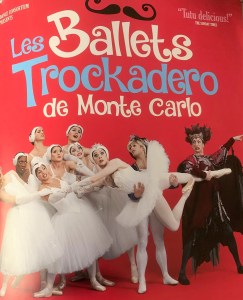 Wasn’t it the great Jona Lewie who said – and I think it was – You’ll Always Find Me In The Kitchen At Parties? Sadly, that’s where Terry Johnson has chosen to set his latest offering, The Sex Party – not in the living room where everyone’s getting down and dirty, but in the kitchen, where everyone’s either embarrassed, or bitching and moaning, or being offensive or just getting steadily chateau’d. To be honest you’d get a lot more entertainment from Jona Lewie’s 7-incher than you would by sitting through two hours twenty minutes of this dismal and, frankly, unpleasant play.
Wasn’t it the great Jona Lewie who said – and I think it was – You’ll Always Find Me In The Kitchen At Parties? Sadly, that’s where Terry Johnson has chosen to set his latest offering, The Sex Party – not in the living room where everyone’s getting down and dirty, but in the kitchen, where everyone’s either embarrassed, or bitching and moaning, or being offensive or just getting steadily chateau’d. To be honest you’d get a lot more entertainment from Jona Lewie’s 7-incher than you would by sitting through two hours twenty minutes of this dismal and, frankly, unpleasant play.
 But first, gentle reader, let me cast your mind back to April of last year. Maria Friedman had just finished her short spell at the Menier performing Legacy, which we unfortunately missed. But we were waiting for the announcement of the next show at this much-loved theatre. And we waited… and we waited. Surely the Menier hasn’t… closed?… we thought? No movement on the website – nothing in the social media. Don’t say this is the end….? And then a sign of life – the Menier would be reopening in November, with the latest play by Terry Johnson. I jumped at the chance – as I am sure many others did. We’ve all missed the Menier and were sad at the thought that it might never reopen; basically we would have booked to see anything. And Terry Johnson too – he’s a reliable old theatrical character, with hits like Dead Funny and Insignificance to his name. What could possibly go wrong?
But first, gentle reader, let me cast your mind back to April of last year. Maria Friedman had just finished her short spell at the Menier performing Legacy, which we unfortunately missed. But we were waiting for the announcement of the next show at this much-loved theatre. And we waited… and we waited. Surely the Menier hasn’t… closed?… we thought? No movement on the website – nothing in the social media. Don’t say this is the end….? And then a sign of life – the Menier would be reopening in November, with the latest play by Terry Johnson. I jumped at the chance – as I am sure many others did. We’ve all missed the Menier and were sad at the thought that it might never reopen; basically we would have booked to see anything. And Terry Johnson too – he’s a reliable old theatrical character, with hits like Dead Funny and Insignificance to his name. What could possibly go wrong?
 To be fair, not quite everything. Tim Shortall has constructed a fantastic set depicting a well-to-do Islington kitchen. Every detail is realised immaculately. The matching kettle and toaster; the yuppie cookbooks including that Leon one that all posh people have; the well-stocked patio garden. Boy, you could live in that kitchen. There are some good performances too. Jason Merrells is a safe pair of hands as Alex, whose home it is and who is holding the party, along with the excellent Molly Osborne as Hetty, who is the bubbliest and most welcoming of hostesses without going over the top. The first scenes find them greeting their first guests, the verging-on-spoilt Gilly (Lisa Dwan) and her husband, the verging-on-tedious Jake (John Hopkins), both excellent in conveying their characters’ annoying habits and difficult relationship.
To be fair, not quite everything. Tim Shortall has constructed a fantastic set depicting a well-to-do Islington kitchen. Every detail is realised immaculately. The matching kettle and toaster; the yuppie cookbooks including that Leon one that all posh people have; the well-stocked patio garden. Boy, you could live in that kitchen. There are some good performances too. Jason Merrells is a safe pair of hands as Alex, whose home it is and who is holding the party, along with the excellent Molly Osborne as Hetty, who is the bubbliest and most welcoming of hostesses without going over the top. The first scenes find them greeting their first guests, the verging-on-spoilt Gilly (Lisa Dwan) and her husband, the verging-on-tedious Jake (John Hopkins), both excellent in conveying their characters’ annoying habits and difficult relationship.
 Strangely, if Terry Johnson had left it there, with two embarrassed and embarrassing guests being manipulated by two ostensibly charming hosts, it might have developed into something reasonable. A dash of Who’s Afraid of Virginia Woolf mixed with a splodge of Relatively Speaking to make a modern-day Comedy of Manners that dismantles 2022 Britain (and let’s face it, it needs some dismantling) through the eye of a swingers’ party. But no – Johnson gives us five more characters to contend with, four of which position themselves variously on the thoroughly irritating spectrum; and the fifth, a catalyst with which to throw a big spanner in the works.
Strangely, if Terry Johnson had left it there, with two embarrassed and embarrassing guests being manipulated by two ostensibly charming hosts, it might have developed into something reasonable. A dash of Who’s Afraid of Virginia Woolf mixed with a splodge of Relatively Speaking to make a modern-day Comedy of Manners that dismantles 2022 Britain (and let’s face it, it needs some dismantling) through the eye of a swingers’ party. But no – Johnson gives us five more characters to contend with, four of which position themselves variously on the thoroughly irritating spectrum; and the fifth, a catalyst with which to throw a big spanner in the works.
 That last character is Lucy – played with immaculate reserve and control by Pooya Mohseni – a discreet and refined woman who happens to be trans but doesn’t expect to make a big thing of it. Terry Johnson, however, wants a very big thing to be made of it. At this point, he throws all these disparate elements up into the air and lets them land higgledy-piggledy on the stage to let everyone fight it out in the manner of a live Twitter spat. The rest of the play is an experiment in seeing how far you can take the mickey out of transphobia, and questions how long is it funny to do so before it starts getting uncomfortable.
That last character is Lucy – played with immaculate reserve and control by Pooya Mohseni – a discreet and refined woman who happens to be trans but doesn’t expect to make a big thing of it. Terry Johnson, however, wants a very big thing to be made of it. At this point, he throws all these disparate elements up into the air and lets them land higgledy-piggledy on the stage to let everyone fight it out in the manner of a live Twitter spat. The rest of the play is an experiment in seeing how far you can take the mickey out of transphobia, and questions how long is it funny to do so before it starts getting uncomfortable.
 Answer: not long. It falls to Broadway and Hollywood star Timothy Hutton, in his London stage debut (so bizarre that he should have chosen this play for this significant step in his career), as the American businessman Jeff, in what often feels to be a very stilted performance, to bombard Lucy with offensive, intrusive and crass questioning about her right to call herself a woman; goaded on by the almost equally offensive beliefs and asides of his Russian wife Magdalena, whom I think is meant to be a humorous character but comes across way off the mark.
Answer: not long. It falls to Broadway and Hollywood star Timothy Hutton, in his London stage debut (so bizarre that he should have chosen this play for this significant step in his career), as the American businessman Jeff, in what often feels to be a very stilted performance, to bombard Lucy with offensive, intrusive and crass questioning about her right to call herself a woman; goaded on by the almost equally offensive beliefs and asides of his Russian wife Magdalena, whom I think is meant to be a humorous character but comes across way off the mark.
 Can you write a play examining transphobia? Of course you can. But this isn’t it. It doesn’t contain sufficiently robust conversations or plot development; in fact there were a couple of lengthy and excruciatingly dull sequences – one where Magdalena likens herself to a butterfly, another where there is a pointless conversation about whether people like dogs. The play lacks the required delicacy and integrity to manage its own sensitive subject matter, and whatever humour there is misses its spot so that the audience is reduced to squirming in their seats. There’s even a short scene at the end of the play that explains what has happened to some of the characters some months later, as if we cared. It was very noticeable how the energy of the audience members had been hugely sapped as we all slunk out at the end,
Can you write a play examining transphobia? Of course you can. But this isn’t it. It doesn’t contain sufficiently robust conversations or plot development; in fact there were a couple of lengthy and excruciatingly dull sequences – one where Magdalena likens herself to a butterfly, another where there is a pointless conversation about whether people like dogs. The play lacks the required delicacy and integrity to manage its own sensitive subject matter, and whatever humour there is misses its spot so that the audience is reduced to squirming in their seats. There’s even a short scene at the end of the play that explains what has happened to some of the characters some months later, as if we cared. It was very noticeable how the energy of the audience members had been hugely sapped as we all slunk out at the end, with no one quite daring to say WTF did we just see? – but definitely thinking it.
with no one quite daring to say WTF did we just see? – but definitely thinking it.
A wasted opportunity? Yes. A tasteless evening of deliberate provocation without anything to back it up? Also yes. Hurrah for the return of the Menier Chocolate Factory, but let this play die a quiet death and never be spoken of again. Two stars is generous, but it’s a proficient production.
Production photos by Alastair Muir
 Two Disappointing for Anything More
Two Disappointing for Anything More










































































